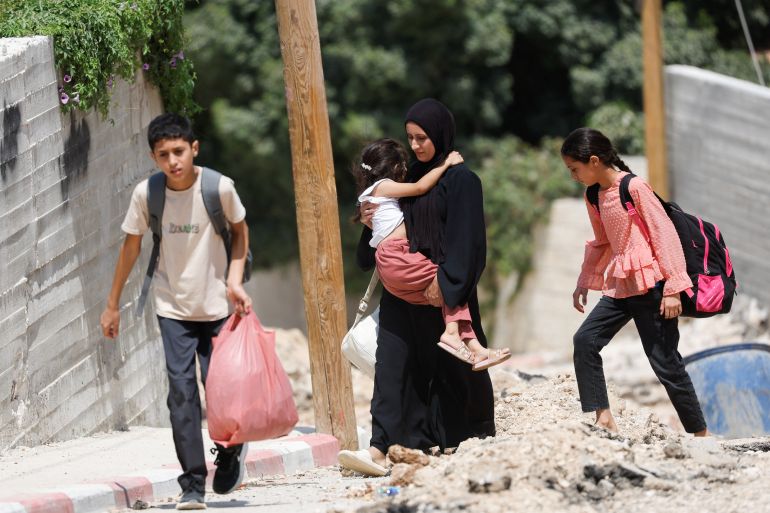Lack of food and water, ambulances blocked as Israel lays siege to Jenin
Israeli reinforcements enter the besieged part of the occupied West Bank as assault on refugee camp enters its fifth day.
Since the beginning of the Israeli assault on August 28, at least 24 Palestinians in Jenin have been killed, with dozens more injured or detained, according to Wafa news agency [Mohammed Torokman/Reuters]Published On 1 Sep 20241 Sep 2024
The Israeli siege of the West Bank city of Jenin has left Palestinians with no food, water or electricity, with medical charity Doctors Without Borders, known by its French initials MSF, accusing Israeli forces of obstructing access to health facilities and targeting ambulances.
“All basic necessities” including bread inside the refugee camp “no longer exist”, Taher al-Saadi, a resident of Jenin who managed to escape, told Al Jazeera.
Keep reading
list of 3 itemsend of list
Fayza Abu Jaafar, another resident who fled Jenin, said the situation is “very hard” for children still trapped in the area, as they are “terrified” of the destruction carried out by Israeli forces.
The Israeli military brought in reinforcements on Sunday after demolishing shops and bulldozing streets, while preventing tens of thousands of Palestinian civilians from accessing humanitarian aid, in a step described as a “war crime”. Israel has also been accused of war crimes during its ongoing military offensive in Gaza.
According to the Jenin municipality, the Israeli army has bulldozed nearly 70 percent of the city’s streets and 20km (12.4 miles) of its water and sewage networks since it launched its raids on Wednesday, August 28. As a result, 80 percent of the Jenin refugee camp, home to 20,000 people, is left without water access, the Jenin municipality said.
At least 24 Palestinians have been killed in a five-day Israeli assault that Al Jazeera correspondent Nida Ibrahim said was “the most destructive raid we’ve seen” in decades.
“We are hearing exchange of fire and loud explosions,” Ibrahim reported. “The main streets of Jenin have also been destroyed and bulldozers are digging up the area.”
“This is a reminder of what it means to be a Palestinian under military occupation. You have no control over your town, no control over your streets. You don’t know if you’re going to get home safely or even if your home is going to be spared,” Ibrahim said while reporting from the outskirts of Jenin.
Kamal Abu al-Rub, the governor of Jenin, has described the situation so far as similar to the 2002 Israeli destruction in which the camp was “flattened” and dozens were left dead.
‘Clear war crime’
Aside from the extensive damage to public utilities and infrastructure, Israeli troops have also raided numerous homes and damaged and “looted” private properties, while subjecting residents to interrogations and “harsh treatment”, the Palestinian Wafa news agency reported.
Among those who were subjected to interrogation and beating was a trained volunteer from Doctors Without Borders (MSF), the group said in a statement, adding that Israeli forces have surrounded Khalil Suleiman Hospital, forcing its team to suspend dialysis care to patients in Jenin.
“Israel must respect its obligations as an occupying power in the occupied West Bank,” MSF said.
Israel has killed at least 675 Palestinians in the occupied West Bank since October 7. During the same period, more than 10,300 Palestinians have been arrested and detained by Israeli forces.
Israel’s intensifying campaign in the occupied West Bank comes as its bombardment of Gaza has killed more than 40,000 Palestinians and destroyed large parts the besieged enclave.
The Palestinian news agency Wafa reported that up to 70 percent of the roads in the city of Jenin have been destroyed by Israeli forces [Ronaldo Schemidt/AFP]
In an interview with Al Jazeera on Sunday, Kenneth Roth, the former head of Human Rights Watch, said that what Israel did in Gaza over the last 11 months is now being carried out in the occupied West Bank.
“This has really become a flat-out war,” said Roth, who is now a visiting fellow at the Princeton School of Public and International Affairs.
“One of the basic rules is that Israel has to allow access to humanitarian aid. It cannot just cut off food, water, electricity and medical care there, as we’ve heard it is doing. It has a duty to allow these into the civilian population,” Roth added.
He said that Israel cannot use the presence of fighters in the occupied West Bank as an excuse “to starve civilians”.
“Rather than fighting the militants, which Israel has a right to do, it is fighting the entire population. And that is a clear war crime.”
